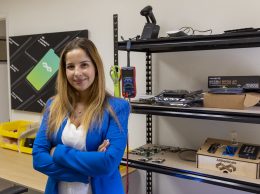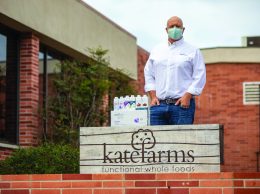NextMover, GearUp take top spots at Santa Barbara Startup Weekend
A company looking to shake up the moving industry took home $55,000 and the top spot at Santa Barbara’s third Startup Weekend, one of 200 such gatherings taking place across the globe Nov. 15-17.
The event challenges budding entrepreneurs and programers to launch a startup with just 54 hours separating the concept and final product. The events have been held in Santa Barbara, Santa Maria and San Luis Obispo. The execution, design and business model of the pitches were judged by Kevin O’Connor, co-founder and CEO of Summerland-based FindTheBest; Klaus Schauser, co-founder and chief strategist of AppFolio in Goleta; and Jon Funk of Ocean Road Partners, among others.
A website called NextMover took home first place for its interface that aims to provide users a cheaper alternative to moving companies. Marketing itself as “your friend with a truck,” the site connects movers with others who can get the job done and are looking to make a quick buck.
The project ended the weekend with $55,000 from four different investors. “My dream is to build a profitable company. I can’t believe I came here with an idea and we raised money,” team member Alexander Kehaya said.
According to Kehaya, the moving service industry is “fragmented and ripe for destruction.” NextMover plans to capitalize on this by targeting densely-populated areas with a young population. Users will be able arrange transportation for big moves or just a big purchase and the team expects to build its customer base by incorporating social networking and a loyalty program.
Another online community, GearUp, claimed second place. Like NextMover, the website seeks to give users a fresh way to save and earn cash, this time by renting outdoor equipment. With its “gear-to-peer” structure, anyone can list unused belongings such as kayaks, skis and bikes and collect a per-day fee when they are rented.
Team member Brianna Seapy said the service will be more cost-efficient than renting from a store and especially makes sense for travelers or those trying an outdoor activity for the first time.
This year’s event gave participants the opportunity to utilize 3-D printing technology to encourage the development of physical products. Taking home the Best Physical Product and Most Crowd-Fundable awards was TouchStone, which developed small pebble-like bluetooth devices that allow people who cannot speak to communicate emotions.
Users place a “stone” in their palm and it gathers data from visual cues and hand gestures. It then translates this information into a message about the holder’s well-being, which it sends to smartphones.
Team member Andreas Forsland said he was inspired by the seven weeks he spent at his mothers bedside earlier this year while she was sick with pneumonia and unable to communicate with him.
“Maybe if you can’t talk, you can still tell people, I feel anxious or happy,” Forsland said.
The team’s research indicated a $1.2 trillion potential market in health care alone. However, they are hopeful it can reach beyond a strictly medical application.
“It’s an intimate, nonverbal way to communicate that I’m not here but I’m thinking of you,” Forsland said.
O’Connor, one of the judges, said it was a unique invention. “I have never seen anything like this before – I’ll give you that,” he said. “It’s pretty wild.”
An award for Crowd Favorite went to My Parking Spot, a site that provides a platform for homeowners to their rent driveways to people who need parking space, and the team from My Custom Cookie, which uses 3-D printing to create personalized cookie cutters, was given the Most Hustle award.











